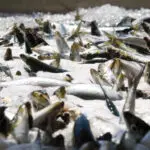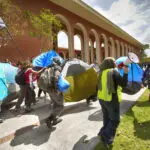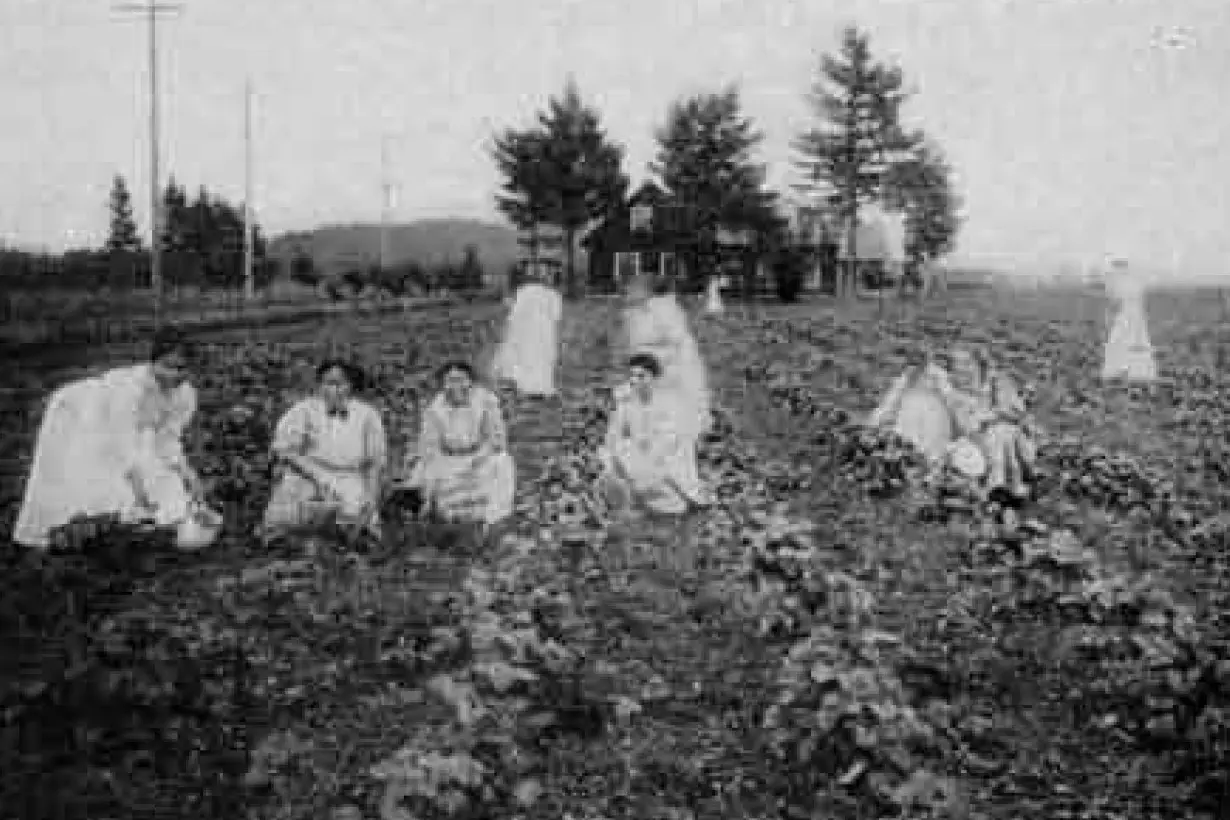ANCHORAGE, Alaska (AP) — Lucy Pitka McCormick’s relatives cooked salmon, moose, beaver and muskrat over an earthen firepit on the banks of the Chena River, just outside Fairbanks, as they honored her life. They whipped whitefish, blueberries and lard into a traditional Alaska Native dessert, and dolloped servings onto a paper plate, setting it in the flames to feed her spirit.
The family prayed as McCormick's great-grandson built a small plywood coffin that was filled with gifts and necessities for the next world, such as her granddaughter's artwork and a hairbrush.
The weeklong Koyukon Athabascan burial ceremony in September was traditional in all ways but one: McCormick died in 1931. Her remains were only recently identified and returned to family.
McCormick was one of about 5,500 Alaskans between 1904 and the 1960s who were committed to a hospital in Portland, Oregon, after being deemed by a jury “really and truly insane,” a criminal offense.
There were no facilities to treat those with mental illness or developmental disabilities in what was then the Alaska territory, so they were sent — often by dog sled, sleigh or stagecoach — to a waiting ship in Valdez. The 2,500-mile (4,000 km) journey ended at Morningside Hospital.
Many never left, and their families never learned their fate.
They are known as the Lost Alaskans.
For more than 15 years, volunteers in Fairbanks and in Portland have been working to identify the people who were committed to the hospital. Many were buried in Portland cemeteries, some in unmarked pauper graves. A few, like McCormick, have been returned to Alaska for proper burials.
“It was pretty powerful that we had Lucy back,” said her grandson, Wally Carlo. “You could feel the energy when she came back to Alaska, like she had to wait 90-some years for this.”
A new database went online in February to help families see if their long-lost auntie or great-grandfather were among those sent to Morningside. The website, which builds on an earlier blog, is a clearinghouse for research performed by the volunteers.
Finding information has been laborious. Most records at the private hospital were lost in a 1968 fire, and territorial officials didn’t document those who were committed.
The volunteers became history detectives in an investigation that has spanned more than 15 years. Among them: former Alaska health commissioner Karen Perdue; two retired state judges, Niesje Steinkruger and the late Meg Green; and two other Fairbanks residents, Ellen Ganley and Robin Renfroe, aided by Eric Cordingley, a cemetery volunteer in Portland.
They combed through dusty Department of Interior records at the National Archives, the Alaska and Oregon state archives, and old Alaska court records for any tidbit: the results of commitment trials, cemetery files, death certificates, old newspaper stories and U.S. marshals reimbursement records for the costs of escorting patients.
Ganley and Perdue started the search at the National Archives in College Park, Maryland, in 2008. Armed with laptops and a scanner, they gave themselves a week to find any reference to Perdue’s uncle, Gilford Kriska, who had disappeared from the village of Nulato, on the Yukon River in western Alaska, when he was a boy.
They found a wealth of information about others in Morningside's payment requests for housing Alaskans. Finally, they saw her uncle's name on a patient trust account, showing the federal government owed him a few cents.
That entry provided his patient number, which they used to uncover more about Kriska, including that it was village nuns who had him committed.
Kriska eventually returned to Fairbanks, where Perdue said she met him once in the 1970s.
“He was mildly what we would call developmentally disabled today,” she said. He could read and write but had few life skills.
Perdue said that while she was health commissioner, from 1994 to 2001, many people approached her with similar stories of long-missing relatives. That pain had been passed down in the families for decades — “intergenerational trauma," Perdue said.
There are several thousand names in the new database, with more names and details being added. Users might be able to find when and why a patient was committed, when they left or died, a burial location, and a death certificate.
The hospital was founded in the late 19th century by Dr. Henry Waldo Coe, initially in his home and later on a bucolic farm in Portland. It operated under several names before it was called Morningside.
In 1904 it received a government contract to care for mentally ill Alaskans, a contract that lasted until after Alaska gained statehood in 1959 and began to build its own mental health facilities.
A variety of Alaskans wound up there: miners, housewives, Alaska Natives, a co-founder of Juneau, a banker from Fairbanks. Causes included postpartum depression, cabin fever, epilepsy, addiction and syphilis. The youngest patient was 6 weeks old; the oldest was 96.
Parents sometimes would frighten their children into behaving by mentioning the hospital. “Inside, outside, Morningside," became a common phrase denoting people could stay in Alaska, move away or be committed.
It was likely letters written by the patients were never sent, and they never received mail meant for them, according to evidence found by retired judge Steinkruger.
Morningside’s treatment of its residents came under public scrutiny by the 1950s. Congressional hearings and public outrage eventually helped force its closure in 1968. A shuttered mall off Interstate 205 now sits on its former grounds.
From Portland, Cordingley documented burial sites at several cemeteries and obtained 1,200 Oregon death certificates.
“I’m just glad that I happened to be here when they needed someone to help,” said Cordingley, who has volunteered at his neighborhood cemetery for about 15 years, helping to clean headstones and decipher obscure burial records.
In 2012, he began creating his own databases to help families find lost loved ones. He built three virtual cemeteries at www.findagrave.com, including photos of death certificates, burial sites and in some cases the patients. One virtual site is dedicated to Alaska Natives who died at Morningside, a second to other patients and a third for Alaska children who died at another Oregon institution, Baby Louise Haven.
Cordingley found Lucy McCormick’s grave marker in Portland, informed the family — they were stunned — and later watched as she was disinterred.
McCormick’s aunt, Fairbanks furrier Helen Callahan, claimed she was “insane,” and McCormick was admitted to Morningside April 5, 1930, after a jury confirmed Callahan's diagnosis, records show.
In January 1931, doctors performed a hysterectomy. McCormick died within weeks from a post-surgery infection.
Wally Carlo said his father and uncles never talked about McCormick, and he never knew what happened to her. After Cordingley found her grave, the family decided to bring her home, Carlo said.
On a beautiful fall day, relatives launched four boats on the Yukon River to take her to her birthplace in the village of Rampart. They were escorted by eagles and swans, “like a salute to Grandma Lucy,” he said. She was laid to rest on a hill overlooking the village of 29 people and the river.
“Don’t ever give up hope and try to get them back to where they belong,” he said. “Their spirits don’t rest until they’re found and brought back home.”
___
Online: The new database: www.lostalaskans.com A prior blog: www.morningsidehospital.com Alaska Natives who died at Morningside: https://www.findagrave.com/virtual-cemetery/552288 Other patients who died at Morningside: https://www.findagrave.com/virtual-cemetery/152302






























